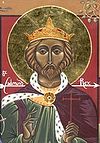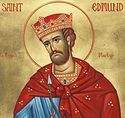

| Previous day | Next day |
| Old Style
November 20
|
Sunday |
New Style
December 3
|
|
26th Sunday after Pentecost.
Tone 1.
Nativity Fast. |
Fish, wine and oil allowed.
|
![]() Forefeast of the Entry of the Most Holy Theotokos into the Temple.
Forefeast of the Entry of the Most Holy Theotokos into the Temple. ![]() St. Gregory of Decapolis (816).
St. Gregory of Decapolis (816). ![]() St. Proclus, archbishop of Constantinople (446-447).
St. Proclus, archbishop of Constantinople (446-447).
Martyr Dasius of Dorostolum in Moesia (284-305). Martyrs Eustace, Thespesius, and Anatolius, of Nicaea (312). Hieromartyr Nerses, bishop of Shahrqart (Kirkuk), and his disciple Martyr Joseph, and those martyred with them in Persia: Hieromartyrs John, Shapur, and Isaac, bishops of Seit Selok; Martyrs Guhshtazad, eunuch, Mari, Sasan, Tima, Noah, and Zaun, of Lashom; and Bautha, Denachis, Thecla, Dinaq, Tatun, Mama, Mazakya, Ana, Abyat, and Hatay (343). St. Diodorus, founder of Yuriegorsk Monastery (Solovki) (1633). St. Parasceva (Rodimtseva), abbess of Toplovsky Convent (Simferopol) (1928).
New Hieromartyrs Macarius (Karmazin), bishop of Dnepropetrovsk, Arsenius (Dmitriev), abbot, of the Tikhvin Monastery, Eutychius (Kachur), abbot, of the St. Marcian Skete (Ukraine), Hilarion (Pisarets), hieromonk of Glinsk Hermitage, Alexis Amanov, archpriest, of Zaraisk (Moscow), Vladimir Medvediuk, archpriest, of Yazvishche (Moscow), Alexis Nikatov, archpriest, of Ignatovo (Moscow), John Savr, archpriest, of Tikhvin, and Alexander Sakharov, archpriest, of Petrovskoye (Ryazan) (1937). New Nun-martyr Ioannikia (Kozhevnikova), abbess of the Convent of the Entry of the Theotokos (Tikhvin) (1937).
St. Isaac, catholicos of Armenia (440). St. Theoctistus the Confessor, of Constantinople (855). Martyr Edmund, king of East Anglia (869). St. Sozomen of Cyprus (12th c.).
Thoughts for Each Day of the Year
According to the Daily Church Readings from the Word of God
By St. Theophan the Recluse

Twenty Sixth Sunday After Pentecost. [Eph. 5:9-19; Luke 12:16-21]
Having spoken the parable about the man who became rich and planned to just eat, drink and be merry, and for this was struck with death, not remaining alive for the supposed pleasures, the Lord concluded: So is he that layeth up treasure for himself, and is not rich toward God. “So”—that is, such occurs, or such a lot befalls both these and others. Those who become rich and forget about God only think about pleasures of the flesh. Let those who desire to avoid this bitter lot “lay up” not “unto themselves, but be rich only toward God.” Since riches come from God, then devote them to God when they flow, and holy riches will come of it. Divide all surplus with the needy: this will be the same as returning to God what was given by God. He who gives to a poor person gives to God. Seemingly exhausting his riches, such a person becomes truly rich—rich through good deeds, rich for God. In pleasing Him he becomes rich in God, and by attracting His good will, he becomes rich from God, Who makes one who is faithful over a few things, ruler over many things. He becomes rich toward God, and not toward himself, for he does not consider himself to be master of the house, but only a steward and accountant, whose entire concern consists of satisfying all who come to him in need. But he fears spending anything in particular on himself, considering it to be an improper usage of property entrusted to him.
Articles
 St. Proclus the Archbishop of ConstantinopleSaint Proclus, Archbishop of Constantinople, from his early years devoted all his time to prayer and the study of Holy Scripture. |
 Martyrs Eustace, Thespesius, and Anatolius of NiceaThe Holy Martyrs Eustathius, Thespesius and Anatolius, natives of the city of Gangra, were the children of a rich merchant. |










